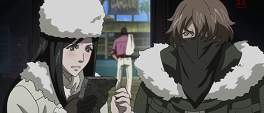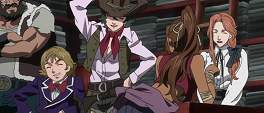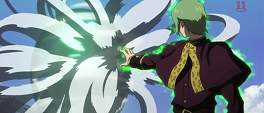Most of Tatakau Shisho: The Book of Bantorra feels like an incompetent comedian trying to tell a joke: each story ends with blank faces, raised eyebrows and a belated admission along the lines of "oh and there was a lizard who made everyone angry". It isn't a lack of time or imagination that scuppers the series, but a dearth of storytelling proficiency. Characters are introduced with no explanation as to why they were absent in the previous episodes, throwaway events from ten episodes prior are made crucial in a disparate storyline and deaths come frequently but are at best poorly handled and at worst treated as inconsequential. These faults don't prevent enjoyment of its unique world and ideas, but do turn an otherwise highly promising start into a lacklustre continuation.
Split across multiple loosely connected stories, the overarching plot concerns the library of Bantorra and the collection of militant librarians which reside there. Located on an island at the centre of the known world, the librarians are charged with protecting the stone "books" which are born from people when they die; these books are organised in the multiple sub-levels of the library with the most treasured volumes in the lowest and most heavily guarded areas. The librarians fight against a group known as the Church of Drowning in God's Grace which aims to create a mythical "True Man". All is not as it seems though and in a world where death comes swiftly and brutality is everywhere, the three ancient deities of the world have plans which will affect all of the world's denizens.
The most immediately egregious element of the series concerns the names of the voluminous cast; eclipsing even Baccano's assault on pronunciation, these names are bizarre in English, so hearing them uttered in cautious Japanese makes keeping track of everyone a task unto itself. This is countered somewhat by the individuality in the character designs which has roots in 1920's gangster-chic but draws on varied influences from medieval Europe to Russian winter fashion. Pleasing though it may be to move away from the teenage girl archetype, the cast isn't bereft of buxom females and the scattershot approach to clothing means there is often at least one set of cleavage on display at any one time, mostly by the acting director whose shirt is rarely more than casually buttoned. All of this isn't without its detriments though as the budget rarely does the concepts justice and mid-series visuals lack the detail necessary to convincingly pull some of the scenes off.
Worse than the naming scheme however is the storytelling which, in a rare twist, is markedly worse than the stories themselves - demonstrating solid emotional cores and strong themes to be then obviated by a scrappy narrative. Most of the issues stem from an ambivalent attitude towards foresight: plot seeds are planted far in advanced of when they are necessary and then left to wither until they are needed, requiring a hasty and jarring resurrection; alternatively characters and systems are messily bolted on at the beginning of story arcs then ignominiously killed off or subsequently forgotten about, ultimately inconsequential to the main narrative. Character weighting is similarly dubious with cast members crucial to ongoing events left largely as ciphers - the green-haired Volken and purple-haired Chacoly prime examples - whereas less important characters are gifted with entire sidestories of their own - do-gooder Mirepoc and playboy Mattalast both interminably forced upon the audience.
Disappointing doesn't begin to summarise this situation: when each story, epic and grand in its inception, is rife with emotion and madness and cover topics ranging from theology to nihilism, to have a constant nagging feeling that something is amiss is infuriating. Fundamental to this lack of cogency is the absence of any kind of comparison, a "straight man" to the ongoing bedlam. Ignoring the nomenclature bandied about so freely, when magic systems are introduced and wars referenced without context or precedence, confusion reigns. Disheartening then when the narrative style - poorly singposted flashbacks, out-of-sequence storytelling - robs one of the series' most important deaths of its impact. The storyline and consequences are given the weight such an endearing character's loss deserves; however it is handled with all the grace and deftness of a giraffe on ice.
Tellingly, the recap episode is almost entirely useless beyond a reminder of names not mentioned for a few episodes - annoying when for once it is most needed, if not simply to pluck the wheat and discard the chaff. How closely the series adheres to the plot and themes present in the light novel source is up for interpretation; however it is hard to believe that such an affirming end could follow the bleak and malevolent collection of stories that preceded it. When critical elements such as storytelling and pacing are so egregiously malformed, other aspects take a back seat regardless of their quality. The vocal cast covers a wide range with some prolific actors including Romi Park, Akira Ishida, Miyuki Sawashiro and Yuuichi Nakamura all lending their talents to an unintrusive performance; the score on the other hand is a mixed bag with some stand out background tracks juxtaposed against dreadful opening and endings, the former of which is gifted with three stylish animation sequences while the latter only succeeds in filling time until the next episode preview.
There is a lot to love with Tatakau Shisho: The Book of Bantorra but no way to attach oneself to it; the series remains out of reach to all but the most patient or dedicated, continually awash with nonsensical speech and impenetrable names, hampered by disjointed stories and jarring narratives. Given the studio responsible, David Productions, has a limited track record which includes participation in Sunrise's Code Geass, the situation is unsurprising especially when the lead creative staff have little high-grade production experience. That is, in a nutshell, what the series is: a big budget, high value concept tethered to untested talent and limited resources. The result isn't unlikable or without merit, but is akin to a slightly more competent Gonzo production in their twilight years. It is often more rewarding to fill in the gaps with thoughts of what could have been, and with time and the right material the studio could well produce a corker of a series; until then, Bantorra remains a great concept, spottily realised.











